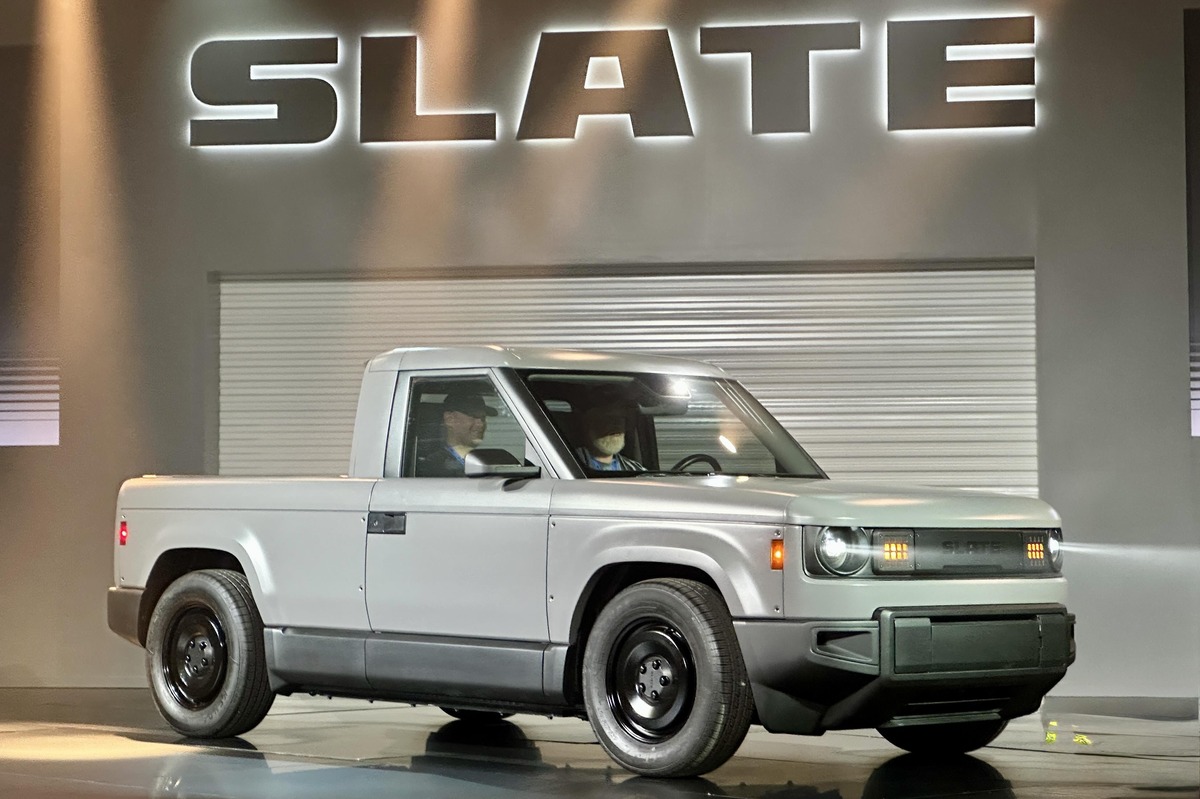A surprise name has entered the race to build truly affordable electric vehicles, and it carries some heavyweight backing. Slate Auto, a young California startup quietly financed by Amazon founder Jeff Bezos, this week pulled the wraps off a compact pickup it simply calls the S1. At the press reveal, CEO Maya Gomez said the base model will start “just under thirty thousand dollars before incentives,” a figure that would make it the least-expensive highway-capable EV in North America when it reaches showrooms in 2026. “We think the transition to electric stumbles if ordinary families are priced out,” Gomez told NBC News, adding that the company’s internal target is to beat the best-selling Toyota Tacoma on out-the-door cost before rebates.
“We think the transition to electric stumbles if ordinary families are priced out”
How is Slate Pulling off this Price-Point?
Slate’s business case rests on two cost savers. First, the truck rides on a highly modular skateboard that shares stamped panels and power electronics across three future models, an approach the company says cuts assembly time by forty percent. Second, the battery pack swaps pricey nickel-manganese chemistry for lithium-iron-phosphate (LFP) cells sourced from CATL. LFP’s raw materials are cheaper and more stable, and the chemistry tolerates more charge cycles. “You forfeit a little energy density, but you slash dollars per kilowatt-hour, and that is what moves the adoption needle right now,” Slate’s battery chief Ravi Narayanan told InsideEVs.
Why are most electric cars still more expensive than their gasoline cousins?
Batteries remain the elephant in the showroom. US News & World Report estimates that they account for roughly a quarter of an EV’s total cost, a figure that balloons when manufacturers rely on high-nickel cells designed for 300-plus-mile ranges many commuters never use. Add the price of twin inverters, rare-earth magnets, and extensive thermal management, and even efficient factories struggle to push sticker prices below forty thousand dollars. Rivian CEO RJ Scaringe summed up the dilemma in an interview with CarScoops last month: “Shoppers need more sub-$50K options, but we can’t get there unless the supply chain and the chemistry change.”
Slate Auto argues that the chemistry has, in fact, changed. The S1’s standard pack is a 55-kWh LFP unit good for an estimated 230 miles. Range-hungry buyers can spec a 75-kWh pack, but Gomez maintains that most owners will find the smaller battery, paired with a standard heat-pump and 180-kW DC fast-charging, more than adequate. Production is slated for a new, highly automated line in Mesa, Arizona, where the company targets 120,000 units a year once ramp-up is complete.
Skeptics point out that plenty of startups have promised cheap EVs only to stumble on capital costs and supplier delays. Commodity prices remain volatile and interest rates high, any of which could erode Slate’s margin cushion. Still, Bezos’s backing and a pragmatic focus on proven LFP chemistry give the project unusual credibility. If the S1 does reach dealers at $25,000, it could do more to democratize electric mobility than any super-car-quick flagship yet released, proving that batteries don’t have to come with a luxury surcharge forever.
About Slate Autos
Slate Auto, founded in 2023 and headquartered in Palo Alto, has spent the past two years operating in “deep stealth” while prototyping a modular EV platform it calls the FlexSkate. Seed funding came from Bezos Expeditions alongside a handful of former Tesla and Rivian engineers who left to chase a singular goal: deliver battery-electric vehicles that can undercut mainstream gas models without government incentives. The company’s 120-person team now spans battery chemistry, software, and advanced manufacturing, and management says its lean structure – outsourcing non-core stamping and focusing on shared sub-assemblies – will let it reach positive gross margins by the S1’s second full year of production.


